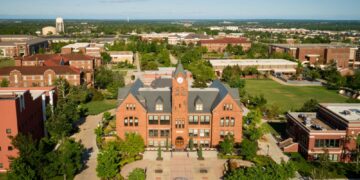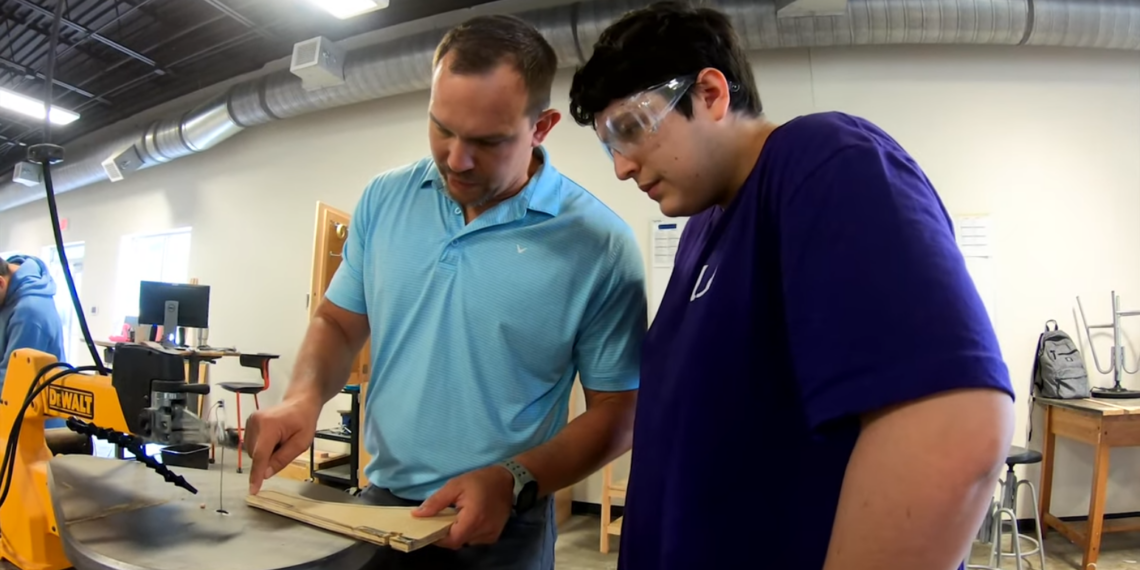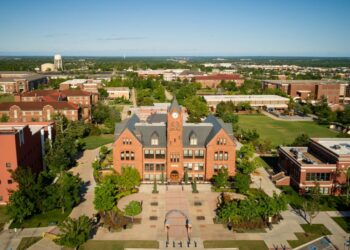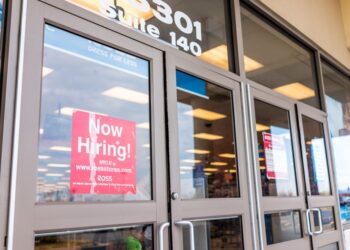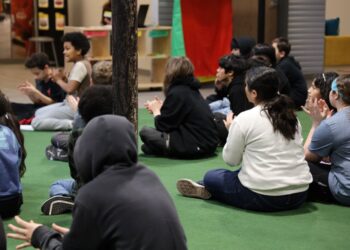TULSA, Okla. (OBV) – An innovative program in Tulsa is helping public school students find career pathways through construction classes. The developer of the program says a bill that expands graduation requirements to include career readiness training will help students achieve future success.
Jeffrey Smith, the CEO of the Home Builders Association of Greater Tulsa, spoke with Oklahoma Business Voice about the program, which started in 2020.
The Home Builders Association contacted representatives with Union Public Schools and Tulsa Public Schools in 2020 and expressed interest in launching shop classes at the school. Union school officials seized the opportunity, and the class, called Intro to Construction, became a one-hour elective course that year.
“At the time, we said if we can get 25 incoming freshmen to express interest or enroll in that class, that would be considered a success. [The school district] rolled it out for pre-enrollment to their eighth graders moving up to ninth grade. They had about 160 students that raised their hand and said, ‘Hey, this looks cool. I want to do this,” Smith said. “And so we started year one, during COVID, with a full class, 125 students. So five hours, 25 students each. And those were all freshmen at the time.”
Union Public Schools officials saw the need to help and wanted to make a difference.
“We’ve been trying to work on growing that program. It all came about because we kept hearing from so may people in the construction industry that they were not able to find enough qualified workers. The demand continued to grow, so we thought this is an area where we have the potential to help,” said Chris Payne, chief communications officer for Union Public Schools.

It’s an effort akin to what House Bill 3278 is trying to accomplish.
House Bill 3278 creates the Graduation Act of 2024. The bill, which gives Oklahoma high school students more graduation requirement flexibility so they can take classes that will help them along their career path, is working its way through the Oklahoma Legislature.
The bill recently passed the Oklahoma Senate as an emergency measure with a 35-11 vote.
Rep. Rhoda Baker, R-Yukon, and Sen. Adam Pugh, R-Edmond, wrote the bill, which requires eighth through 12th grade students in Oklahoma public schools to complete modified graduation requirements starting in the 2025-26 school year.
“This [legislation] wasn’t born out of Rhonda Baker just wanting to eliminate requirements. We asked school districts if we were going to innovate and provide them maximum flexibility what would that look like by law? This [bill] was those school districts request,” Pugh said on the Senate floor. “We brought a number of education advocacy groups, into meetings. We brought businesses into meetings. We brought school board members into meetings. We brought superintendents and teachers into meetings. And we said, ‘If we give you maximum flexibility to provide a host of innovative options for your students on whatever pathway they choose, what does that look like?'”
HB 3278 will enable students to gain the skills they need for their future careers, Smith said.
“We feel like it has a positive impact on any of these career pathway courses. There’s several more than just the construction pathways that we’re creating, but it’s giving a little bit of flexibility to the local school district on what they can qualify for,” he said.
The Home Builders Association’s construction education program grew in popularity.
The Intro to Construction program was expanded to Union’s high school campus the following year, providing the course to 125 students, and maintained the 125-student freshmen academy course as well.
Smith and his Home Builders Association colleagues inquired if the students who took the class would be interested in moving onto a more in-depth, second-year construction course. Fifty percent of the students said they were interested.
Around 55-60 students continued into the level two course, learning all aspects of construction, Smith said.
The program provides students education for around 14 different construction career pathways, including architecture, engineering and side planning to licensed trades, general contracting and home design work.
“A level one course is designed to spend about three weeks on each of those areas and just hopefully peak an interest for a student that might [gain] a career pathway moving forward,” Smith said.
Construction education has touched the lives of thousands of Union students.
“Over the last three years, we now have had about 1,000 students go through the program. We just keep working on extending it,” Payne said. “Things are going very well. Reception among the students is very, very high.”
Union’s mission is a 100 percent graduation rate and ensuring that their students are college and career ready.
“And that means providing a lot of different pathways for students to be engaged, and construction is an area where they are very happy to have the help,” Payne said. “We do want to be part of the solution in meeting the local needs for construction workers.”
The program does not offer trade certifications, but puts students on the path to obtaining one.
“And then, depending on what they want to do with a level two course, they can make that more specific to one or two of those areas and spend more time in that [specific trade area], and then potentially continue on to [Oklahoma] CareerTech, where they’re getting a certification,” Smith said.
Although the program is essentially an elective intro to construction course, students gain a tremendous amount of math skills from participating in the course.
“That’s all hands-on activities, a little bit of bookwork,” Smith said. “The students are really excited about it.”
The program has continually grown at Union since its inception, which now has 400 students enrolled in the construction courses.
“This is by far my favorite class,” said Jack Federline, a Union High School sophomore. “A lot more hands-on type of stuff and not a lot to do with paper or your laptop.
“All schools should be like that, to get you ready for what you want to do in the field,” said Hayden Brunner, a Union High School senior.
The construction education program has inspired some students to consider furthering their education.
“By giving young people exposure to the construction industry, we have had some students who have said they might be interested in a career in architecture or construction management. By giving students that exposure, they are now considering construction-related programs that may require more school,” Payne said.
The Homebuilders Association rolled out the program at Nathan Hale High School in Tulsa in 2021 and found similar success.
“We were like, ‘Well, maybe we can get one or two classes there.’ We filled it up, 125 students, and it’s maintained at 125 students. They haven’t grown as much as Union has, but they have 125 students in their program,” he said.
The program will be expanded to Broken Arrow in August, and students are eagerly anticipating its arrival.
“I just talked to their administration last week, and they actually shut off their pre-enrollment [for the program] because they were like, ‘We already have 180 students that have expressed interest. There’s no reason to add any more students to a waitlist,'” Smith said. “So, it’s been a very successful program.”
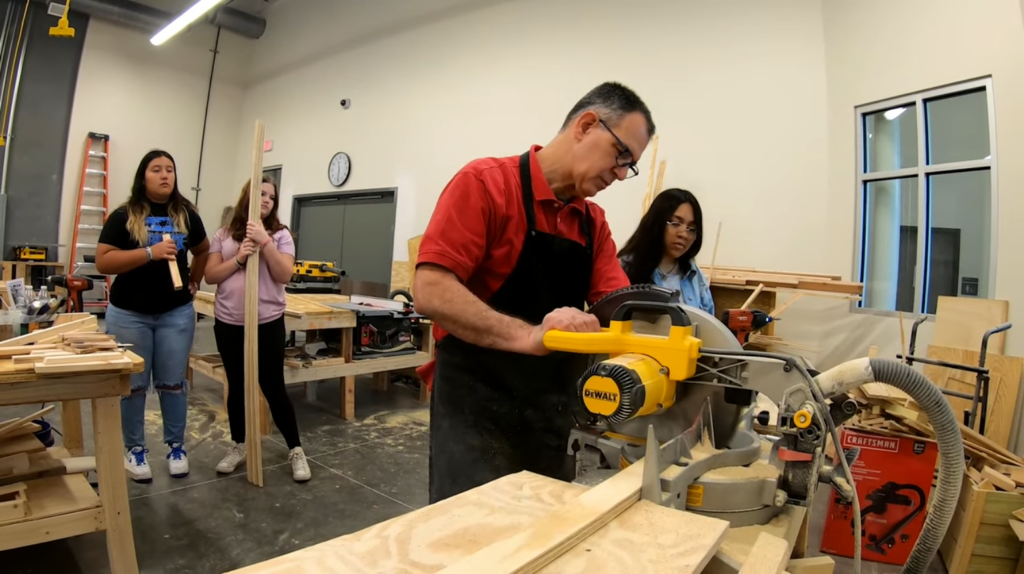
Some students who want to participate in the program have encountered roadblocks.
“What we’re hearing roadblock wise from some of these students, especially your students that are either athletes or in the arts or the extracurricular activities that are taking up that sixth hour of their school, is then they’re becoming very limited on the flexibility in their schedule because of the core curriculum requirements within the state,” Smith said. “And so, they really have to know exactly what they’re doing up front. I mean, they’re not going to be able to take P.E. class or these other classes if they’re going to focus on construction, their elective is going to be construction and baseball and or construction. So, it’s really limiting on that.”
Students who move on from the program to CareerTech, potentially doing concurrent classes in their junior and senior years, are especially limited, Smith said.
“Because now you’re taking away a lot of those elective courses that are available for graduation because your CareerTech classes are going to be half a day or 2.5 hours worth of your class,” Smith said. “And so, there’s very little flexibility when you start getting your core curriculum, CareerTech potentially. And then if you throw in a sport or arts or something that they have to go to every day.”
HB 3278 expands graduation requirements to allow for students to choose career training education, but requires students to take four math courses, including Algebra I and either Algebra II or Geometry.
Students must also complete six Individualized Career and Academic Plan (ICAP) pathway units that can span a range of subjects and career paths selected by the district board of education. New requirements also include a postsecondary-approved full-time CareerTech program or locally approved science-based application course to satisfy the required physical science unit.
The purpose of the modifications is to provide students training and education that will prepare them to enter the workforce upon graduation and start their career with the skills they will need to succeed, according to bill’s authors.
Smith said he hopes HB 3278 is signed into law so students can have the benefits of both their core education and education that will better prepare them for the workforce.
“Your core curriculum of algebra 1, geometry and algebra 2 is great, and that might help you a little bit in life, but if you can actually team them with a career that includes some of that training, then I think that’s a lot more valuable. The flexibility that House Bill 3278 provides, I think, is going to be a huge win for the state.”




